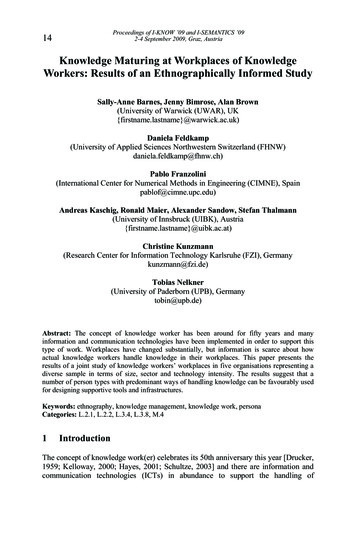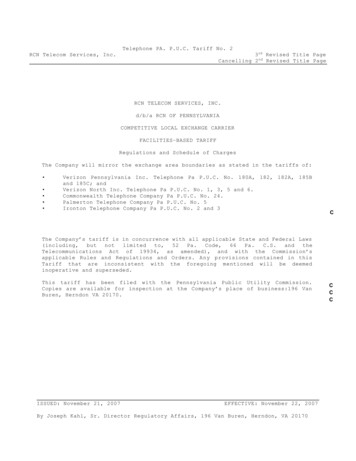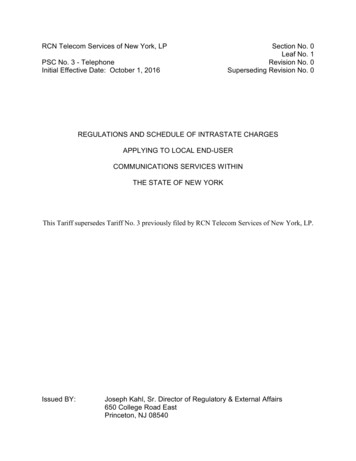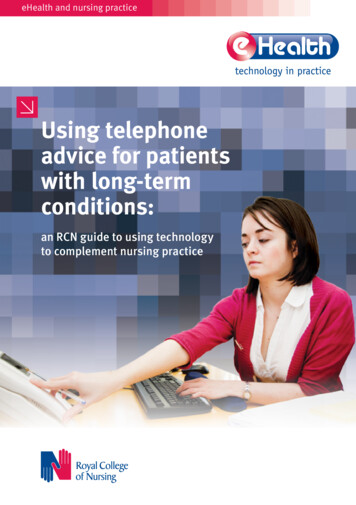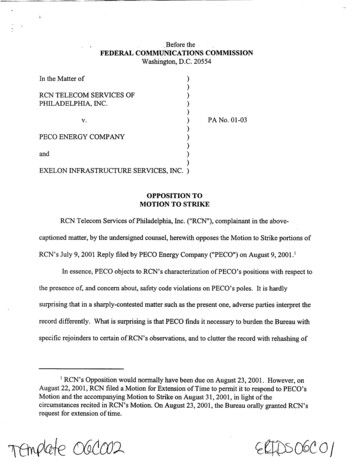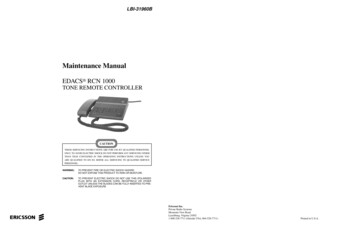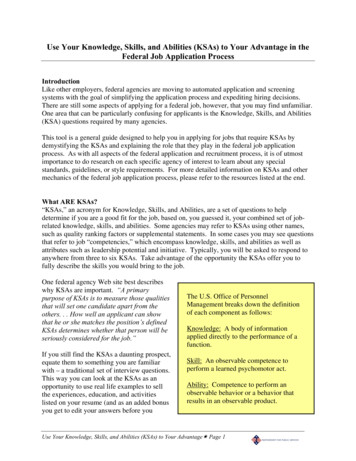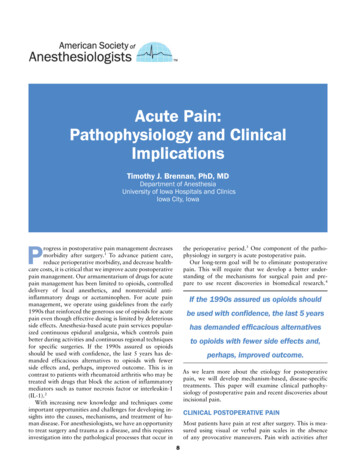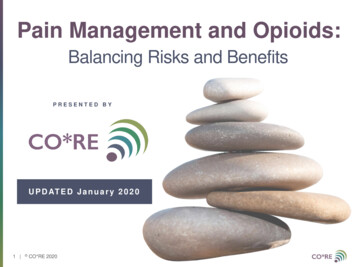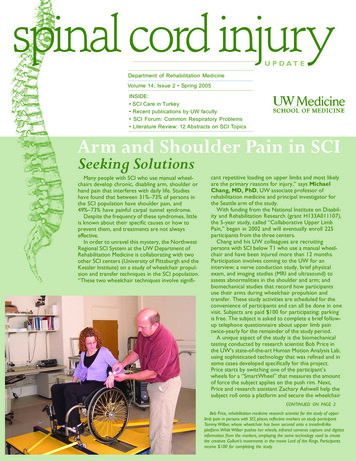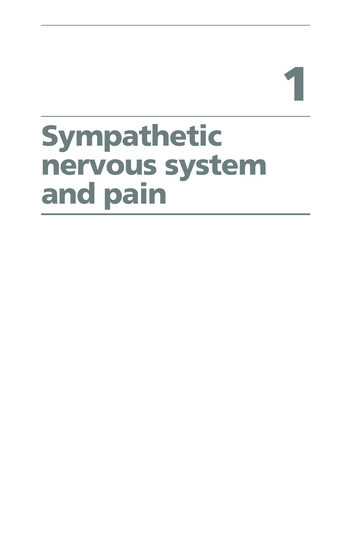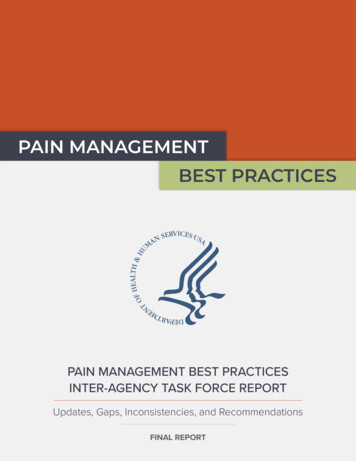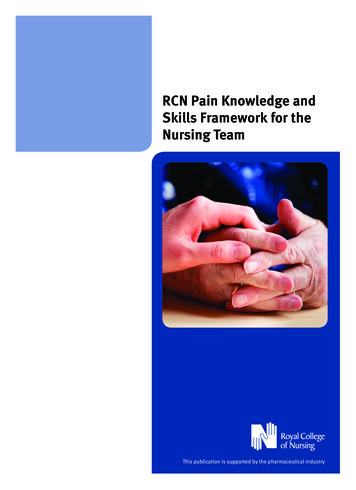
Transcription
RCN Pain Knowledge andSkills Framework for theNursing TeamThis publication is supported by the pharmaceutical industry
RCN Pain Knowledge and Skills Framework for the Nursing TeamFelicia Cox 1 (Chair), Karin Cannons 2 and Sarah Lewis 2 on behalf of the working party for theRoyal College of Nursing (RCN) Pain and Palliative Care Forum.Working Party ContributorsDr Donna BrownDenise EverettSue JenkinsJanet RobertsRachel TownsendSteve WardThanks toProfessor Nick Allcock, Dr Emma Briggs, Amanda Cheesley, Dr Gillian Chumbley, Dr FionaDuncan, Tanis Hand, Professor Alison Leary, Nik Payne, Professor Kate Seers, Professor PatriciaSchofield, Gill Simon, Christine Waters, New Zealand Pain Society Nurses’ Interest Group, The RoyalCollege of Nursing and all reviewers.No competing interests have been declared.ConsultationThis document was circulated widely and hosted on RCN webpages during the one monthconsultation period. The circulation list included RCN Fora, Royal Colleges, Professional Colleges,organisations supporting people with pain and specialist pain nursing networks in the UK, Irelandand New Zealand.EndorsementThis document is endorsed by the British Pain Society.Dissemination planThe nursing co-ordinator will be responsible for dissemination to professional and patientorganisations and ensuring that the current document version is available for download fromRCN webpages. Previous versions will be archived adhering to RCN policy.Supported by an educational grant from Grünenthal Ltd UK.This publication is supported by the pharmaceutical industry.12Royal College of Nursing and British Pain SocietyRoyal College of Nursing2
RCN Pain Knowledge and Skills Framework for the Nursing TeamContentsForeword4Glossary5Rationale and approach6Framework summaries9Guide for implementation11Knowledge and skills framework for unregistered staff12Unregistered staff understanding pain13Unregistered staff pain assessment15Unregistered staff physical strategies to manage pain17Unregistered staff self-management strategies19Unregistered staff pharmacological strategies21Unregistered staff interventional strategies23Unregistered staff service development25Unregistered staff complex pain management26Knowledge and skills framework for registered nurses28Registered nurse understanding pain29Registered nurse pain assessment32Registered nurse physical strategies to manage pain34Registered nurse self-management strategies37Registered nurse pharmacological strategies40Registered nurse interventional strategies42Registered nurse service development44Registered nurse complex pain management46References483
RCN Pain Knowledge and Skills Framework for the Nursing TeamForewordAssessing and managing pain are essential components of nursing practice. Pain is often categorisedas acute or chronic, but it is a complex physical, psychological and social phenomenon that isuniquely subjective. A key fundamental of nursing care, patients continue to report unrelieved painduring procedures, after surgery, during episodes of acute illness, in the community and in carehomes. Pain traverses all clinical settings and the age spectrum, yet is often poorly assessed andmanaged by nurses. This results in short and long-term adverse consequences. Article three of theInternational Association for the Study of Pain (IASP) Declaration of Montreal (IASP 2010) cites theright of all people with pain to have access to appropriate assessment and treatment of the pain byadequately trained health care professionals.Poorly managed acute pain may result in the development of chronic pain which is known to havea strong association with anxiety, depression, quality of life and the ability to sleep, communicateand work. The key common findings of surveys of chronic pain inform us that one in five people ofall ages have moderate to severe chronic pain and one-third of individuals of working age who havechronic pain have lost the ability to perform wage-earning or other work (IASP 2011).The Royal College of Nursing (RCN) has launched this document in all four UK countriessimultaneously. The content has been endorsed by the British Pain Society (BPS) and has beenpresented at the 2015 European Federation of IASP Chapters (EFIC) meeting. It is hoped that thisframework document will enable a common understanding and terminology to develop, so thatlevels of competency can be understood across the nursing continuum in all four countries.Designed to be adapted for local use by individual staff members, this framework should be of greatpractical use for employers when it comes to writing role descriptions and conducting performancereviews; and for employees needing to evidence their competency, on-going development and asserttheir fitness to practice during professional revalidation.Felicia CoxChair, RCN Pain and Palliative Care Forum4
RCN Pain Knowledge and Skills Framework for the Nursing TeamGlossaryInterdisciplinary team (IDT) – team consisting of nursing, physiotherapy, pharmacy, psychology,occupational therapy and medical colleagues. This team contains specialists with expert skills inpain assessment, functional performance and medicines management. The IDT can help patientsunderstand their pain-related thoughts, emotions and behaviours.Pain – an unpleasant sensory and emotional experience associated with actual or potential tissuedamage, or described in terms of such damage (IASP 2012).Registered – a registered nurse, health visitor or midwife who has completed a qualification, iscompetent and on the Nursing and Midwifery Council (NMC) register.Unregistered – a member of the nursing team (supervised by a registered nurse) providing healthand social care to patients. Unregistered staff may be employed as a care assistant, health caresupport worker or associate/assistant practitioner.5
RCN Pain Knowledge and Skills Framework for the Nursing TeamRationale and approachThe Royal College of Nursing (RCN) is the major professional body for nursing in the UnitedKingdom (UK). The RCN Knowledge and innovation action plan for 2014-2018 (RCN 2014) aims todevelop new knowledge and evaluate its impact. The action plan supports identifying and helping tofill gaps in standards, guidance and knowledge resources for nursing staff.The publication of Pain after surgery (RCS 1990) spearheaded the need for the implementationand development of acute pain services in the UK. At that time, few hospitals had an acute painservice nor nurses specialising in pain management. Professor Kate Seers represented nursing on thisworking party and we are grateful that she contributed to a panel discussion in 2013 organised bythe RCN Pain and Palliative Care Forum.This event was chaired by Professor Nick Allcock and the panel consisted of expert paineducationalists, academics, researchers and specialist nurses. It was convened to develop astrategy to identify pain-related learning needs of the nursing team. Contributors included nurserepresentatives of patients from vulnerable groups including older people, those in secure settings ordiagnosed with a learning disability. The panel agreed that there was a need to produce supportiveeducational materials to facilitate an enhanced awareness of the importance of the assessment andmanagement of pain.The panel agreed two work streams. The first was to produce accessible information about pain in anEasyRead format for people with a learning disability. A separate working party convened to produceEasyRead information on pain; after surgery, epidural analgesia and patient controlled analgesia(PCA). These were launched in June 2015 at RCN Congress. The second work stream was to developthis framework.Prior to the publication of this document, there were no nationally agreed standards, competenciesor frameworks for pain management nursing in the UK. This RCN-funded project focused ondeveloping a knowledge and skill framework (KSF) to improve the understanding and skill set of thewider nursing team; to promote excellence in practice thus improving patient care and outcomes. Itis anticipated that this project and the publication of this KSF will also help shape health policy byraising the profile of pain through political lobbying.This KSF aims to provide a framework that supports the development of competence in managingpain for the entire nursing team; from care assistants to nurse consultants. The framework containsthe eight aspects of care identified at the roundtable discussion, such as pain assessment andinterventions as well as seven dimensions, for example, nursing responsibility. It has been designedto be used alongside local competency documents and illustrates Benner’s vision of individualnurse’s migration from novice to expert (Benner 1984). There is clear progression in the knowledge,practice and experience of nursing staff working within the framework. Firstly the career framework(Skills for Health 2010) is mapped against both Benner’s levels of performance (novice, advancedbeginner, competent, proficient, expert). These two, in turn, are mapped against levels of educationacross the spectrum from care certificate through to doctoral studies.Content has been split to meet the specific needs of unregistered and registered members of thenursing team. Each staff group has their own framework summary based on Benner’s 1982 novice toexpert levels of practice (Table 1) mapped against levels one to eight (excluding director level) of theSkills for Health Career Framework (SFH 2010) illustrated in Figure 1. The framework summary forunregistered staff is shown in Figure 2 and for registered nurses in Figure 3.6
RCN Pain Knowledge and Skills Framework for the Nursing TeamTable 1: From novice to expert concept (Adapted from Benner 1982)Skill and practice levelExplanatory notesNoviceA beginner with no experience. They are taught general rulesto help perform activities, and their rule-governed behaviouris limited and inflexible. They are told what to do and followinstruction working within protocols and guidelines.Advanced beginnerShows acceptable performance, and has gained prior experiencein actual nursing situations. This helps the nurse* recogniserecurring meaningful components so that principles, based onthose experiences, begin to formulate in order to guide actions.CompetentHas two or three years’ experience in the same field. Theexperience may also be similar day-to-day situations. Thesenurses* are more aware of long-term goals, and they gainperspective from planning their own actions, which helps themachieve greater efficiency and organisation.ProficientPerceives and understands situations as whole parts. Has a moreholistic understanding of nursing, which improves decision-making.These registered nurses learn from experiences what to expect incertain situations, as well as how to modify plans as needed.ExpertNo longer relies on principles, rules, or guidelines to connectsituations and determine actions. They have a deeper backgroundof experience and an intuitive grasp of clinical situations. Theirperformances are fluid, flexible, and highly-proficient.* Nurse refers to all members of the nursing team.7
RCN Pain Knowledge and Skills Framework for the Nursing TeamFigure 1: Skills for Health Career Framework (SFH 2010)Key elements of the career framework987654321Career framework level 9People working at level 9 require knowledge at the most advanced frontier of the field of work and at the interfacebetween fields. They will have responsibility for the development and delivery of a service to a population, at thehighest level of the organisation. Indicative or reference title: director.Career framework level 8People at level 8 at the career framework require highly specialised knowledge, some of which is at the forefront ofknowledge in a field of work, which they use as the basis for original thinking and/or research. They are leaders withconsiderable responsibility, and the ability to research and analyse complex processes. They have responsibility forservice improvement or development. They may have considerable clinical and/or management responsibilities,be accountable for service delivery or have a leading education or commissioning role.Indicative or reference title: consultantCareer framework level 7People at level 7 of the career framework have a critical awareness of knowledge issues in the field and at the interfacebetween different fields. They are innovative and have a responsibility for developing and changing practice and/orservices in a complex and unpredictable environment. Indicative or reference title: advanced practitioner.Career framework level 6People at level 6 require a critical understanding of detailed theoretical and practical knowledge, are specialist and/orhave management and leadership responsibilities. They demonstrate initiative and are creative in finding solutions toproblems. They have some responsibility for team performance and service development and they consistentlyundertake self-development. Indicative or reference title: specialist/ senior practitioner.Career framework level 5People at level 5 will have a comprehensive, specialised, factual and theoretical knowledge within a field of work andan awareness of the boundaries of that knowledge. They are able to use knowledge to solve problems creatively,make judgements which require analysis and interpretation and actively contribute to service and self-development.They may have responsibility for supervision of staff or training. Indicative or reference title: practitioner.Career framework level 4People at level 4 require factual and theoretical knowledge in broad contexts within a field of work. Work is guided bystandard operating procedures, protocols or systems of work, but the worker makes judgements, plans activitiescontributes to serviced development and demonstrates self-development. They may have responsibility for supervisionof some staff. Indicative or reference title: assist
uniquely subjective. A key fundamental of nursing care, patients continue to report unrelieved pain during procedures, after surgery, during episodes of acute illness, in the community and in care homes. Pain traverses all clinical settings and the age spectrum, yet is often poorly assessed and managed by nurses. This results in short and long-term adverse consequences. Article three of theFile Size: 646KBPage Count: 52
